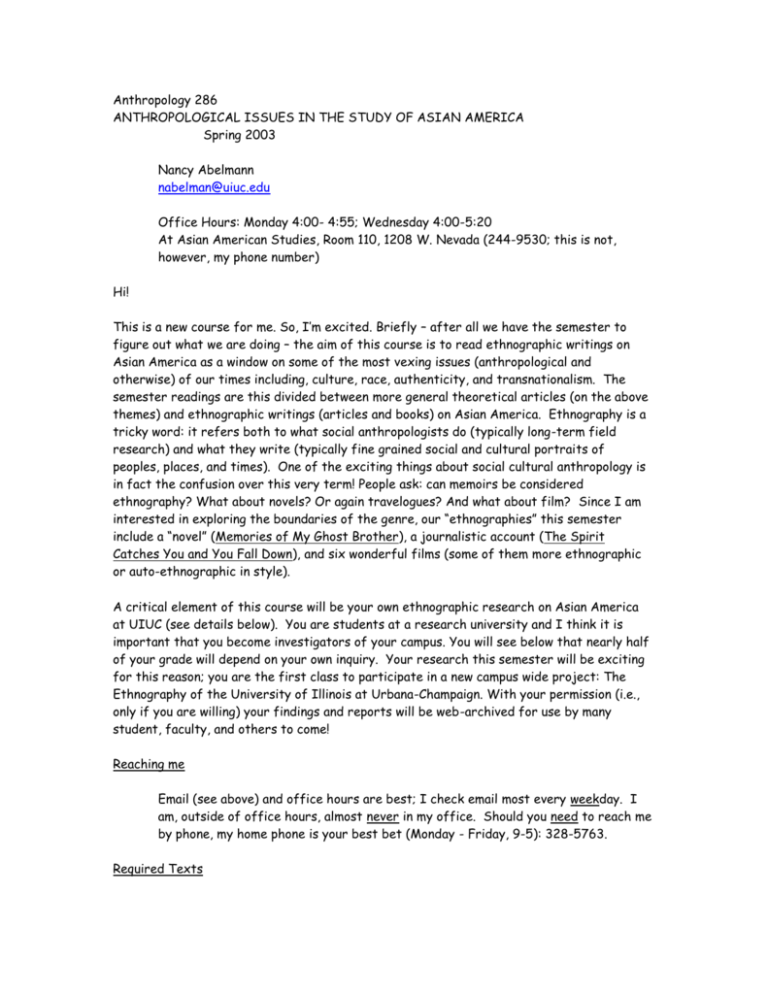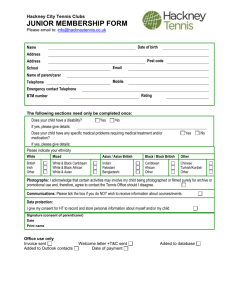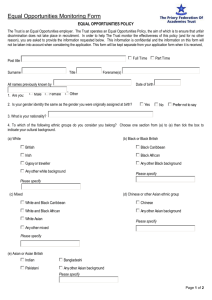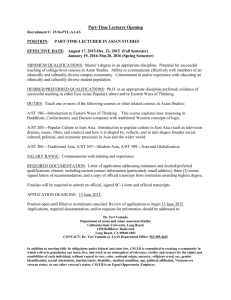E. Other information on Asian Americans generally (I hope you will
advertisement

Anthropology 286 ANTHROPOLOGICAL ISSUES IN THE STUDY OF ASIAN AMERICA Spring 2003 Nancy Abelmann nabelman@uiuc.edu Office Hours: Monday 4:00- 4:55; Wednesday 4:00-5:20 At Asian American Studies, Room 110, 1208 W. Nevada (244-9530; this is not, however, my phone number) Hi! This is a new course for me. So, I’m excited. Briefly – after all we have the semester to figure out what we are doing – the aim of this course is to read ethnographic writings on Asian America as a window on some of the most vexing issues (anthropological and otherwise) of our times including, culture, race, authenticity, and transnationalism. The semester readings are this divided between more general theoretical articles (on the above themes) and ethnographic writings (articles and books) on Asian America. Ethnography is a tricky word: it refers both to what social anthropologists do (typically long-term field research) and what they write (typically fine grained social and cultural portraits of peoples, places, and times). One of the exciting things about social cultural anthropology is in fact the confusion over this very term! People ask: can memoirs be considered ethnography? What about novels? Or again travelogues? And what about film? Since I am interested in exploring the boundaries of the genre, our “ethnographies” this semester include a “novel” (Memories of My Ghost Brother), a journalistic account (The Spirit Catches You and You Fall Down), and six wonderful films (some of them more ethnographic or auto-ethnographic in style). A critical element of this course will be your own ethnographic research on Asian America at UIUC (see details below). You are students at a research university and I think it is important that you become investigators of your campus. You will see below that nearly half of your grade will depend on your own inquiry. Your research this semester will be exciting for this reason; you are the first class to participate in a new campus wide project: The Ethnography of the University of Illinois at Urbana-Champaign. With your permission (i.e., only if you are willing) your findings and reports will be web-archived for use by many student, faculty, and others to come! Reaching me Email (see above) and office hours are best; I check email most every weekday. I am, outside of office hours, almost never in my office. Should you need to reach me by phone, my home phone is your best bet (Monday - Friday, 9-5): 328-5763. Required Texts Lum, Casey Man Kong. 1996. In Search of a Voice: Karaoke and The Construction of Identity in Chinese America (Mahwah, NJ: Lawrence Earlbaum Associates, Publishers) Small, Cathy. 1997. Voyages from Tongan Villages to American Suburbs (Ithaca: Cornell University Press) Fenkl, Heinz Insu. 1996. Memories of My Ghost Brother (NY: Plume) Fadiman, Anne. 1997. The Spirit Catches You and You Fall Down: A Hmong Child, Her American Doctors, and the Collision of Two Cultures (NY: The Noonday Press) Course Reader A Course Reader is available now at Dup-It Copy Shop (808 South 6th Street, Champaign; 337-7000). I have ordered copies for all of you, but it is often still best to call ahead. Assignments (see details at the end of the syllabus) Webboard posts on the 4 books: 20% Webboard posts on thematic sessions: 20% “My Ethnography”: 5 class mini-presentations and Inquiry Page-posting: 40% “My Ethnography” responses: Your response to the Inquiry Pages of your classmates: 5% Two joint responses to the reading (in class): 10 % Class attendance and participation: 5% Something about me I am a social cultural anthropologist with primary interests in East Asia (especially South Korea) and Asian America. I have written books on social movements in South Korea (Echoes of The Past, Epics of Dissent: A South Korean Social Movement, 1996, University of California Press); women and class in South Korea (The Melodrama of Mobility: Women, Talk, and Class in Contemporary South Korea, 2003, University of Hawai’i Press); and Korean America (Blue Dreams: Korean Americans and the Los Angeles Riots, 1995, Harvard University Press, with John Lie). I am currently finishing up an edited volume on the Golden Age of South Korean cinema in the 1950s and 1960s, and – close to home -- I am also writing a book on Korean American college students and their parents in Illinois. Schedule January 22, Wednesday Introduction 2 January 27, Monday ETHNOGRAPHY Rosaldo, Renato. 1989. Subjectivity in Social Analysis. In Culture and Truth: The Remaking of Social Analysis (Boston, MA: Beacon Press). 168-195 & notes. January 29, Wednesday Joint Response #1 “NATIVE” ETHNOGRAPHY Vo, Linda Trinh. 2000. Performing Ethnography in Asian American Communities: Beyond the Insider-versus-Outsider Perspective. In Martin F. Manalansan IV, ed. Ethnographic Explorations of Asian America (Philadelphia, PA: Temple University Press). 17-37. Kang, Miliann. 2000. Researching One’s Own: Negotiating Co-ethnicity in the Field. In Martin F. Manalansan IV, ed. Ethnographic Explorations of Asian America (Philadelphia, PA: Temple University Press). 38-48. February 3, Monday Joint Response #2 CULTURE & TRANSNATIONALISM Abu-Lughod, Lila. 1991. Writing Against Culture. In Richard G. Fox, ed. Recapturing Anthropology: Working in the Present (Santa Fe, New Mexico: School of American Research Press). 137-162. Kelley, Robin D.G. 1997. Looking for the “Real” Nigga: Social Scientists Construct the Ghetto. In Yo’ Mama’s disfunktional! (Boston: Beacon Press). 14-42. February 5, Wednesday Joint Response #3 RACE & RACIAL IDENTITIES 3 Brodkin, Karen. 2000. Introduction. In How Jews Became White Folks & What That Says About Race in America (New Brunswick, NJ: Rutgers University Press). 1-24 & notes. Omi, Michael and Howard Winant. 1993. On the theoretical Status of the Concept of Race. In C. McCarthy and W. Chrichlow, eds. Race, Identity, and Representation in Education (NY: Routledge). 3-10. February 10, Monday Joint Response #4 Lum, Casey Man Kong. 1996. In Search of a Voice: Karaoke and The Construction of Identity in Chinese America (Mahwah, NJ: Lawrence Earlbaum Associates, Publishers). 1-53. February 12, Wednesday Joint Response #5 Lum, Casey Man Kong. 1996. In Search of a Voice: Karaoke and The Construction of Identity in Chinese America (Mahwah, NJ: Lawrence Earlbaum Associates, Publishers). 54-116. February 17, Monday PROFESSOR LUM WILL JOIN US IN PERSON February 19, Wednesday MY ETHNOGRAPHY I Web-Work: Asian Americans at UIUC February 24, Monday Joint Response #6 AUTHENTICITY Prashad, Vijay. 2000. Of Authentic Cultural Lives. In The Karma of Brown Folk (Minneapolis: University of Minnesota Press). 109-132 & notes. Ignacio, Emily. 2002 Pilipino ka ba? Internet Discussions in the Filipino Community. In Rick Bonus and Linda Trinh Vo, eds. Contemporary Asian 4 American Communities: Intersections and Divergences (Philadelphia, PA: Temple University Press). 89-104 Kondo, Dorinne. 1997. The Narrative Production of Home in Asian American Theatre. In About Face: Performing Race in Fashion and Theater (NY: Routledge). 189-209. February 26, Wednesday FILM I: An American Desi March 3, Monday Joint Response #7 Maira, Sunaina. 2002. Nostalgia. In Desis in the House: Indian American Youth Culture in New York City (Philadelphia: Temple University Press). 83148. March 5, Wednesday MY ETHNOGRAPHY II Questions from the Readings March 10, Monday Joint Response #8 Small, Cathy. 1997. Voyages from Tongan Villages to American Suburbs (Ithaca: Cornell University Press) 3-120. March 12, Wednesday FILM II: A Chief in Two Worlds March 17, Monday Joint Response #9 Small, Cathy. 1997. Voyages from Tongan Villages to American Suburbs (Ithaca: Cornell University Press) 121-219. March 19, Wednesday MY ETHNOGRAPHY III 5 Preliminary Research Plan SPRING BREAK !! March 31, Monday Joint Response #10 TRANSNATIONALISM, CONT. Manalansan, Martin F. IV. 2002. Migrancy, Modernity, Mobility: Quotidian Struggles and Queer Diasporic Intimacy. Manuscript. Ong, Aihwa. 1995. Women Out of China: Traveling Tales and Traveling Theories in Postcolonial Feminism. In Ruth Behar and Deborah A. Gordon, eds. Women Writing Culture (Berkeley: University of California Press). 350372. Appadurai, Arjun. 1996. Global Ethnoscapes: Notes and Queries for a Transnational Anthropology. In Modernity at Large: Cultural Dimensions of Globalization (Minneapolis: University of Minnesota Press) 48-65. April 2, Wednesday Joint Response #11 Fenkl, Heinz Insu. 1996. Memories of My Ghost Brother (NY: Plume). 4-133 April 7, Monday FILM III: Camp Arirang April 9, Wednesday FILM IV: First Person Plural April 14, Monday Joint Response #12 Fenkl, Heinz Insu. 1996. Memories of My Ghost Brother (NY: Plume). 137-271. Koshy, Susan. 2000. The Fiction of Asian American Literature. In J. Wu and M. Song, eds. Asian American Studies: Reader. 467-495. 6 April 16, Wednesday Joint Response #13 TRANSNATIONALISM, CONT. Louie, Andrea. 2000. Chineseness across Borders: A Multisited Investigation of Chinese Diaspora Identities. In Martin F. Manalansan IV, ed. Ethnographic Explorations of Asian America (Philadelphia, PA: Temple University Press). 49-63. Schein, Louisa. Forged Transnationality and Oppositional Cosmopolitanism. In Martin F. Manalansan IV, ed. Ethnographic Explorations of Asian America (Philadelphia, PA: Temple University Press). 199-215. April 21, Monday MY ETHNOGRAPHY IV Report from the Field April 23, Wednesday FILM V: History and Memory April 28, Monday Joint Response #14 Fadiman, Anne. 1997. The Spirit Catches You and You Fall Down: A Hmong Child, Her American Doctors, and the Collision of Two Cultures (NY: The Noonday Press). 3153, April 30, Wednesday FILM VI: Becoming American May 5, Monday Joint Response #15 Fadiman, Anne. 1997. The Spirit Catches You and You Fall Down: A Hmong Child, Her American Doctors, and the Collision of Two Cultures (NY: The Noonday Press). 154288, May 7, Wednesday 7 MY ETHNOGRAPHY V Findings and Reflections Assignments and Grading, Details 1. Webboard Posting (by 9 p.m. before the day the readings are assigned) On the 4 Books; 20% On thematic sessions (i.e., not the 4 books): 20% You are each required to “post” on Webboard 8 times over the course of the semester. Webboard is an asynchronous environment in which we can “talk” to one another. A post is a reaction to the reading of the day. Although it is not a formal paper, it should still be: organized, clearly written, and substantiated (i.e., with evidence or examples from the reading). It is not, however, a summary of the reading, but rather a chance for you to begin to respond to the reading. You can use your response to introduce: things you like or don’t like about the piece; things you don’t understand about the piece; the relation of the reading to earlier readings, classroom discussions, or films; discussions you would like us to have about the reading etc. I do welcome you to respond personally to the reading. As far as I am concerned the only way we know how to read is personally; by this I mean that we connect to readings through what we already know and feel and in turn through reading we both challenge and extend what we know and feel. 2. “My Ethnography” 5 class mini-presentations and Inquiry Page-posting: 40% Your response to the Inquiry Pages of your classmates: 5% See next section on the Inquiry Page You will each be conducting a mini-ethnography. Prior to Spring Break you will be generating ideas and questions and thinking about how you might explore these. Please note that three of the 5 mini-presentation/Inquiry Page-postings are due prior to Spring Break; I mention this to underscore that the process of research is as important as the research and results. After Spring Break (i.e., April) you will conduct research (which might, by the way, be virtual). You will note from the syllabus that there are 5 classroom sessions fully devoted to this project; in each of those sessions, you will be keeping us all posted on your research developments. Also, timed with these class sessions you will be reporting to a web-environment called the Inquiry Page. You can think of the Inquiry Page as a document of your research process; it will represent your work and can thus be quite stylized. 8 Let me briefly review the 5 sessions 1. WEB-Work (February 19) You will surf the WEB for 4 sorts of information A. Statistical information about Asian Americans at UIUC. B. Information about Asian American organizations at UIUC. C. Home pages of UIUC Asian Americans D. Other information relevant to Asian Americans at UIUC See end of syllabus for WEB resources I want you to respond to what you find: What surprises you? What are questions that come to mind based on what you find? Are you surprised by what you can and cannot find? You should keep a WEB-log of your searching (including URLs) and questions (on the Inquiry Page) 2. Questions from the Readings (March 5) By this date we will have done lots of reading together. As you read, I want you to be thinking locally (about Asian America at UIUC). Your reading should spark thoughts, observations, questions etc. You should be keeping a WEBlog (on the Inquiry Page) of these. This class session will allow us to discuss the connections that we are collectively making between the reading and UIUC Asian America. 3. Preliminary Research Plan (March 19) Hopefully your WEB-work (see 1. above) and your reading (see 2. above) will generate some questions that will inspire you to begin to think about mini-ethnographic research that would allow you to begin to answer your questions. You should ideally be keeping a WEB-log (on the Inquiry Page) of your research ideas and by this date I hope you will have a preliminary plan. 4. Report from the Field (April 21) As you conduct your research you will be noting significant findings (or anything you want to share) on the Inquiry Page. 9 In class you will report on some the findings you are most excited about. This will also give you a chance to get advice from the class as to how to proceed with and finish up your research. 5. Findings and Reflections (May 7) As you wrap up your research, you will pull together your thoughts on the research. Likely you will have things to say both about your research topic and about the research process itself. In class you will report on both of these. On the Inquiry Page you will post a mini-final paper in which you draw conclusions based on your findings and offer research reflections (circa 5 pages). Your Response to the Inquiry Pages of your classmates (5%): Part of your student work for this course is to tune in to Inquiry Page work of your classmates. There will be space there for you to comment upon their ongoing work and research. I hope that we become a community of researchers/learners who comment upon, question, and help our colleagues. 5. 2 joint responses to the reading (in class): 10 % To complete this assignment, you will meet with a classmate (a different one each time) before the day we discuss the assigned readings. You will discuss your responses to the reading – paying close attention to places of agreement and disagreement. In class you will somehow share your thoughts together – this will help get an excited conversation going. Feel free to be as creative as you would like in your presentation! 6. Class attendance and participation: 5% I have set aside these 5 points, but really as you will gather from the syllabus, this is a course that will demand your constant attendance and participation – otherwise it will be no fun. The Inquiry Page It isn’t so easy to describe The Inquiry Page: in a word it is a pretty cool Web archive developed here at UIUC. We will be using it this semester to house our work. For starters, you will each need to join The Inquiry Page – I figured out how to do it, so I know that you can (remember your password). Find the Inquiry Page at: http://inquiry.uiuc.edu. Under Inquiry Units (the left hand columns) search “EOTU” (for Ethnography of the University) or Abelmann and you will see a list of inquiry units (here is the URL for the search page: 10 (http://www.inquiry.uiuc.edu/php/units.php3). For each of the 5 “My Ethnography” Assignments you will find a separate inquiry unit. What you will be doing is “spinning-off” my units to create your own unit for each assignment (there is a spin-off link on the bar at the top of the page). Although you will be able to edit my original, please DO NOT! Spin-off before you do anything!! You need to name your spin-off units (and any units you create) beginning with “EOTU/Anth286/My Ethnography I (II etc..) (so that we can all find them easily and so that I know which assignment it is). It is very important that you mark each of your units “private” (otherwise anyone in the world can have access to them); NOTE: the default is public, so you need to change it! In order for your classmates and me to be able to see your “private” units, you will need to list “anth 286@” as your co-author and “anth286@” as the co-author’s email; you may choose not to do so until you are ready to share – that way you can work on them privately. When you want to see your classmates units, you will need to sign in as “anth286@” with “anth286@” as your password; if you sign in with your own name and password you will only be able to see your own units. DO NOT WORRY, I will go over all of this on-line in class which should clarify everything. WEB Resources A. Statistical information about Asian Americans at UIUC UIUC http://www.dmi.uiuc.edu (main site) http://www.dmi.uiuc.edu/cp/ (campus profile) UNIVERSITY OF ILLINOIS (i.e., all 3 campuses) http://www.uoapa.uillinois.edu/ http://www.uoapa.uillinois.edu/databook/index.asp B. Information about Asian American organizations at UIUC http://www.uiuc.edu/ro/Cultural_Ethnic.html (organizations at UIUC) C. Home pages of UIUC Asian Americans http://chimp.acm.uiuc.edu/webtools/p-pages/display/ (you can can search by surname (pay attention to links as well). D. Other information relevant to Asian Americans at UIUC http://www.omsa.uiuc.edu/ (Office of Minority Student Affairs) E. Other information on Asian Americans generally (I hope you will all help me add to this list! 11 Websites on Asian American Children, Families, and Education (compiled by UIUC Professor Aaron Ebata) Growing Up Asian in America Asian Pacific Fund http://www.asianpacificfund.org/heritage_contest/guaa99/index.html Essays and artwork by children on growing up Asian American. Asian American Oral History Site University of California at Berkeley http://www.itp.berkeley.edu/~asam150/ Coalition for Asian American Families http://www.cacf.org/ Statistics, resources, bulletin board for professionals and concerned individuals Asian American Resources Massachusetts Institute of Technology http://www.mit.edu/activities/aar/aar.html Center for Multilingual Multicultural Research University of Southern California http://www.usc.edu/dept/education/CMMR/ ERIC Asian/Pacific Pathway http://eric-web.tc.columbia.edu/pathways/asian_pacific/ Designed to inform educators, administrators, parents, and community leaders about the Asian/Pacific American student population and its educational and cultural characteristics. Culturally & Linguistically Appropriate Services Early Childhood Research Institute, UIUC http://www.clas.uiuc.edu/index.html Teachers' Asian Studies Summer Institute California State Polytechnic University, Pomona http://www.csupomona.edu/~tassi/tassi.htm K-12 curriculum and resources on Asian American experiences Asian & Pacific Island American History & Literature for K-12 Teachers Internet School Library Media Center http://falcon.jmu.edu/~ramseyil/asia.htm Fact Sheets, Backgrounders, and Guidelines Facts for Features, Asian & Pacific Islander American Heritage Month 12 US Census Bureau http://www.census.gov/Press-Release/ff98-05.html Asian Americans: Diverse and Growing Population Reference Bureau http://www.prb.org/pubs/bulletin/bu53-2.htm#Intro This Population Bulletin explores the changing ethnic, social, and demographic characteristics of Asian Americans and their effect on U.S. society. Responding to Linguistic and Cultural Diversity: Recommendations for Effective Early Childhood Education National Association for the Education of Young Children http://www.naeyc.org/about/position/psdiv98.htm Beyond Culture: Communicating with Asian American Children and Families ERIC Digest Number 94 http://eric-web.tc.columbia.edu/digests/dig94.html see also: A Guide to Communicating with Asian American Families ERIC Clearinghouse on Urban Education http://eric-web.tc.columbia.edu/guides/pg2.html Meeting the Educational Needs of Southeast Asian Children ERIC Digest Number 68 http://eric-web.tc.columbia.edu/digests/dig68.html Asian American Children: What Teachers Should Know ERIC Digest http://www.ed.gov/databases/ERIC_Digests/ed369577.html Asian American Students At Risk Johns Hopkins University http://www.csos.jhu.edu/../crespar/sept1997page12.html Facts about Asian American Women US Department of Labor http://www.dol.gov/dol/wb/public/wb_pubs/asian97.htm Selecting Culturally and Linguistically Appropriate Materials: Suggestions for Service Providers ERIC Digest http://ericeece.org/pubs/digests/1999/santos99.html Developing Cultural Self-awareness CASAnet 13 http://www.casanet.org/library/culture/culselaw.htm Culturally Competent Practice: Understanding Asian Family Values CASAnet http://www.casanet.org/library/culture/understa.htm 14




